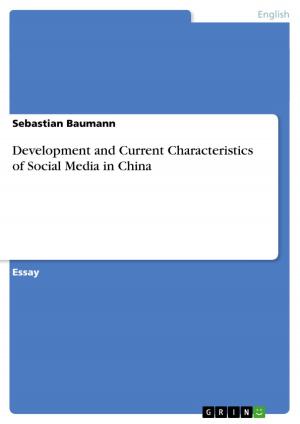Higher & Vocational Education in India
Nonfiction, Social & Cultural Studies, Social Science, Anthropology| Author: | Petra Eichhorn | ISBN: | 9783656260493 |
| Publisher: | GRIN Verlag | Publication: | August 20, 2012 |
| Imprint: | GRIN Verlag | Language: | English |
| Author: | Petra Eichhorn |
| ISBN: | 9783656260493 |
| Publisher: | GRIN Verlag |
| Publication: | August 20, 2012 |
| Imprint: | GRIN Verlag |
| Language: | English |
Seminar paper from the year 2011 in the subject Cultural Studies - Miscellaneous, grade: 1,3, Friedrich-Alexander University Erlangen-Nuremberg (Fachbereich Wirtschaftswissenschaften, Lehrstuhl für Auslandswissenschaft), course: Advanced Industrial Countries and Emerging Markets - Englischsprachige Kulturen, language: English, abstract: The world of the twenty-first century is witnessing a plethora of phenomena such as the global influence of capitalism, market deregulation, internationalization as well as a demand for skilled workers. While these circumstances portray major economic, cultural and social challenges (Rojewski, 2009, p. 19), the higher and vocational education sector is also stipulated to adjust to those changes. According to Beddie (2009, p. 6) '[l]earning is a driver of knowledge-based economies'. In order to enhance progress and prosperity, India faces a huge challenge in terms of producing human capital, which needs to be employable as well as able to adapt to a rapidly changing economy (Ibid., p. 6). Within the last decades, India's largely agricultural-oriented economy has converted into an urban service and manufacturing industry. Heretofore, its higher and vocational education system has failed to respond to that shift (Agarwal, 2010). In spite of India's young population, two-thirds of all Indian enterprises have to cope with a shortage of skilled workers (Deutsche Bank Research, 2011, p. 1). This poses a demanding challenge for governments as well as for non-governmental organizations. As Ansari (1991, p. 131) declared: 'If a country is unable to develop the skills and knowledge of its people and to utilise them effectively in various socio-economic activities, it would be unable to develop anything else. [...] [T]he promotion of human resources by way of strengthening education system [...] is a sine-qua-non for national development.' With respect to the vital role of education, it is pertinent to ask: How can India improve its higher and vocational education system in order to meet the needs of the labor market? Therefore, this paper will briefly enlarge upon the current labor-market situation in India, before outlining the higher and vocational education system. As those structures interact and are needed to understand the mismatch between the available pool of labor and the demand on the job market, they cannot be looked at separately. Furthermore, this essay will discuss the major problems of Indian universities as well as those of the vocational education system. Subsequently, the paper aims to analyze the potential for improvement in both sectors. After elaborating on the Indo-German cooperation in vocational education as a role model for cross-national cooperation, it will state a short conclusion on how India can educate a skilled workforce.
Seminar paper from the year 2011 in the subject Cultural Studies - Miscellaneous, grade: 1,3, Friedrich-Alexander University Erlangen-Nuremberg (Fachbereich Wirtschaftswissenschaften, Lehrstuhl für Auslandswissenschaft), course: Advanced Industrial Countries and Emerging Markets - Englischsprachige Kulturen, language: English, abstract: The world of the twenty-first century is witnessing a plethora of phenomena such as the global influence of capitalism, market deregulation, internationalization as well as a demand for skilled workers. While these circumstances portray major economic, cultural and social challenges (Rojewski, 2009, p. 19), the higher and vocational education sector is also stipulated to adjust to those changes. According to Beddie (2009, p. 6) '[l]earning is a driver of knowledge-based economies'. In order to enhance progress and prosperity, India faces a huge challenge in terms of producing human capital, which needs to be employable as well as able to adapt to a rapidly changing economy (Ibid., p. 6). Within the last decades, India's largely agricultural-oriented economy has converted into an urban service and manufacturing industry. Heretofore, its higher and vocational education system has failed to respond to that shift (Agarwal, 2010). In spite of India's young population, two-thirds of all Indian enterprises have to cope with a shortage of skilled workers (Deutsche Bank Research, 2011, p. 1). This poses a demanding challenge for governments as well as for non-governmental organizations. As Ansari (1991, p. 131) declared: 'If a country is unable to develop the skills and knowledge of its people and to utilise them effectively in various socio-economic activities, it would be unable to develop anything else. [...] [T]he promotion of human resources by way of strengthening education system [...] is a sine-qua-non for national development.' With respect to the vital role of education, it is pertinent to ask: How can India improve its higher and vocational education system in order to meet the needs of the labor market? Therefore, this paper will briefly enlarge upon the current labor-market situation in India, before outlining the higher and vocational education system. As those structures interact and are needed to understand the mismatch between the available pool of labor and the demand on the job market, they cannot be looked at separately. Furthermore, this essay will discuss the major problems of Indian universities as well as those of the vocational education system. Subsequently, the paper aims to analyze the potential for improvement in both sectors. After elaborating on the Indo-German cooperation in vocational education as a role model for cross-national cooperation, it will state a short conclusion on how India can educate a skilled workforce.















